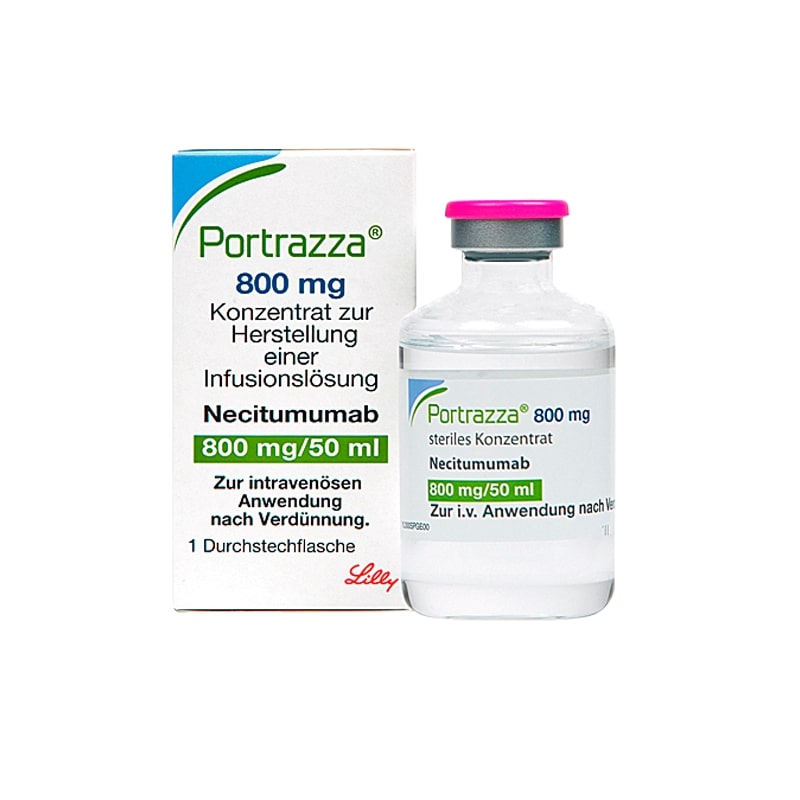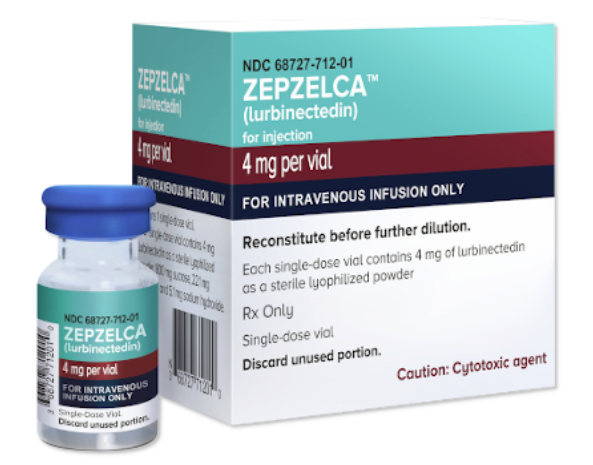Portrazza (necitumumab) vs Zepzelca (lurbinectedin)
Portrazza (necitumumab) vs Zepzelca (lurbinectedin)
Portrazza (necitumumab) is a monoclonal antibody designed to target and block the epidermal growth factor receptor (EGFR), which is often overexpressed in certain types of non-small cell lung cancer (NSCLC), and is used in combination with chemotherapy for the treatment of metastatic squamous NSCLC. Zepzelca (lurbinectedin) is a newer, small-molecule oncology drug that inhibits oncogenic transcription and is indicated for the treatment of metastatic small cell lung cancer (SCLC) after disease progression on or after platinum-based chemotherapy. The choice between Portrazza and Zepzelca would depend on the specific type of lung cancer a patient has (squamous NSCLC for Portrazza, SCLC for Zepzelca), their previous treatments, and their overall health status, which should be discussed with an oncologist.
Difference between Portrazza and Zepzelca
| Metric | Portrazza (necitumumab) | Zepzelca (lurbinectedin) |
|---|---|---|
| Generic name | Necitumumab | Lurbinectedin |
| Indications | Metastatic squamous non-small cell lung cancer (NSCLC), in combination with gemcitabine and cisplatin | Metastatic small cell lung cancer (SCLC), as monotherapy |
| Mechanism of action | Epidermal growth factor receptor (EGFR) antagonist | Triggers apoptosis by binding to DNA, inhibiting transcription |
| Brand names | Portrazza | Zepzelca |
| Administrative route | Intravenous infusion | Intravenous infusion |
| Side effects | Rash, hypomagnesemia, venous thromboembolism | Myelosuppression, fatigue, increased liver enzymes, nausea, decreased appetite, diarrhea, vomiting, constipation, respiratory infection, shortness of breath, cough, musculoskeletal pain |
| Contraindications | None known | None known |
| Drug class | Monoclonal antibody | Alkylating drug |
| Manufacturer | Eli Lilly and Company | Pharma Mar |
Efficacy
Efficacy of Portrazza (necitumumab) in Lung Cancer
Portrazza (necitumumab) is a monoclonal antibody designed for the treatment of advanced squamous non-small cell lung cancer (NSCLC). It targets the epidermal growth factor receptor (EGFR), which is often overexpressed in squamous NSCLC cells. The efficacy of necitumumab was demonstrated in a clinical trial that included patients with advanced squamous NSCLC who had not received prior chemotherapy for their advanced disease. When used in combination with gemcitabine and cisplatin, necitumumab has been shown to improve overall survival compared to chemotherapy alone. However, it is important to note that the improvement in survival was modest and necitumumab has not been shown to be effective in patients whose tumors have EGFR mutations that are treatable with EGFR tyrosine kinase inhibitors.
Efficacy of Zepzelca (lurbinectedin) in Lung Cancer
Zepzelca (lurbinectedin) is a newer chemotherapeutic agent that has shown efficacy in the treatment of small cell lung cancer (SCLC), particularly in patients with disease progression after platinum-based chemotherapy. Lurbinectedin works by binding to DNA and inhibiting the transcription process, which is essential for cancer cell proliferation. The effectiveness of lurbinectedin was evaluated in a multicenter, single-arm, open-label, phase II study. In this study, patients with relapsed SCLC who received lurbinectedin demonstrated a significant overall response rate, indicating that the drug can induce tumor shrinkage. The duration of response and overall survival rates from this study suggested that lurbinectedin is a promising treatment option for relapsed SCLC.
Both Portrazza and Zepzelca represent important advancements in the treatment of different types of lung cancer. While Portrazza offers an additional option for patients with advanced squamous NSCLC, Zepzelca provides hope for those with relapsed SCLC. It is critical for healthcare providers to consider the specific characteristics of a patient's lung cancer, including histological subtype and prior treatment history, when deciding on the use of these medications. Furthermore, the benefits of these treatments must be weighed against their potential side effects and the overall goals of care for each individual patient.
As with all cancer treatments, ongoing research and clinical trials continue to refine the understanding of how best to use necitumumab and lurbinectedin in the management of lung cancer. Patients should engage in detailed discussions with their oncologists to understand the potential benefits and risks associated with these medications and to determine the most appropriate treatment strategy for their specific situation.
Regulatory Agency Approvals
Portrazza
-
European Medical Agency (EMA), European Union

-
Food and Drug Administration (FDA), USA

-
Health Canada

Zepzelca
-
Food and Drug Administration (FDA), USA

Access Portrazza or Zepzelca today
If Portrazza or Zepzelca are not approved or available in your country (e.g. due to supply issues), you can access them via Everyone.org.
How it works

Make an enquiry
Choose the medicine you want to buy, answer a couple of questions, and upload your prescription to speed things up. We’ll get back to you within 24 hours.


Make an enquiry
Choose the medicine you want to buy, answer a couple of questions, and upload your prescription to speed things up. We’ll get back to you within 24 hours.


Breeze through the paperwork
We'll guide you through the required documents for importing unapproved medicine, ensuring you have all the necessary information.


Get a personalized quote
We’ll prepare a quote for you, including medicine costs and any shipping, administrative, or import fees that may apply.


Receive your medicine
Accept the quote and we’ll handle the rest - sourcing and safely delivering your medicine.

Some text on this page has been automatically generated. Speak to your physician before you start a new treatment or medication.
Let's talk
If you have any questions, call us or send us a message through WhatsApp or email:
Contact us




